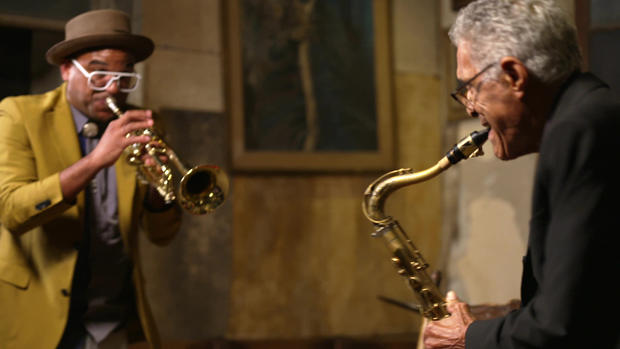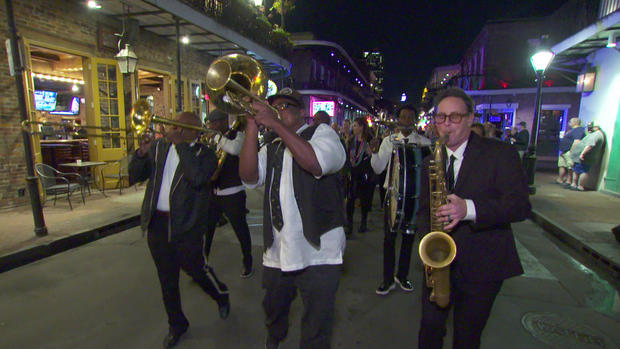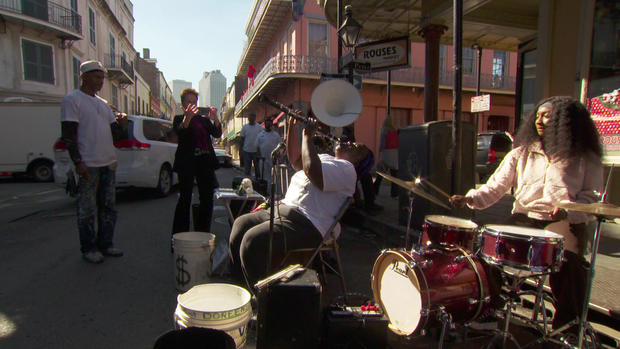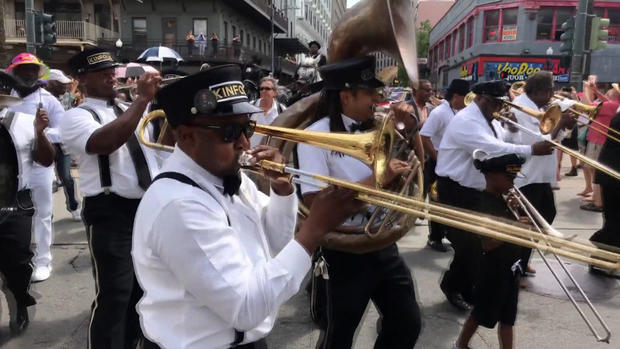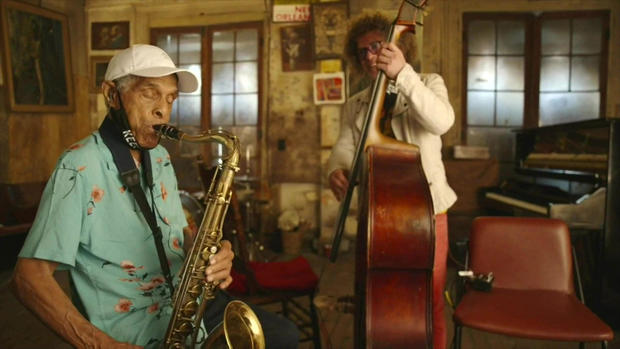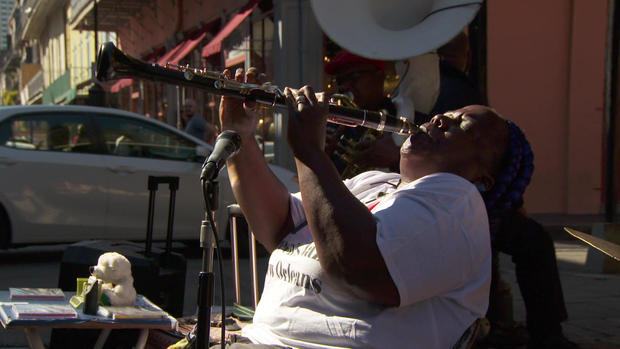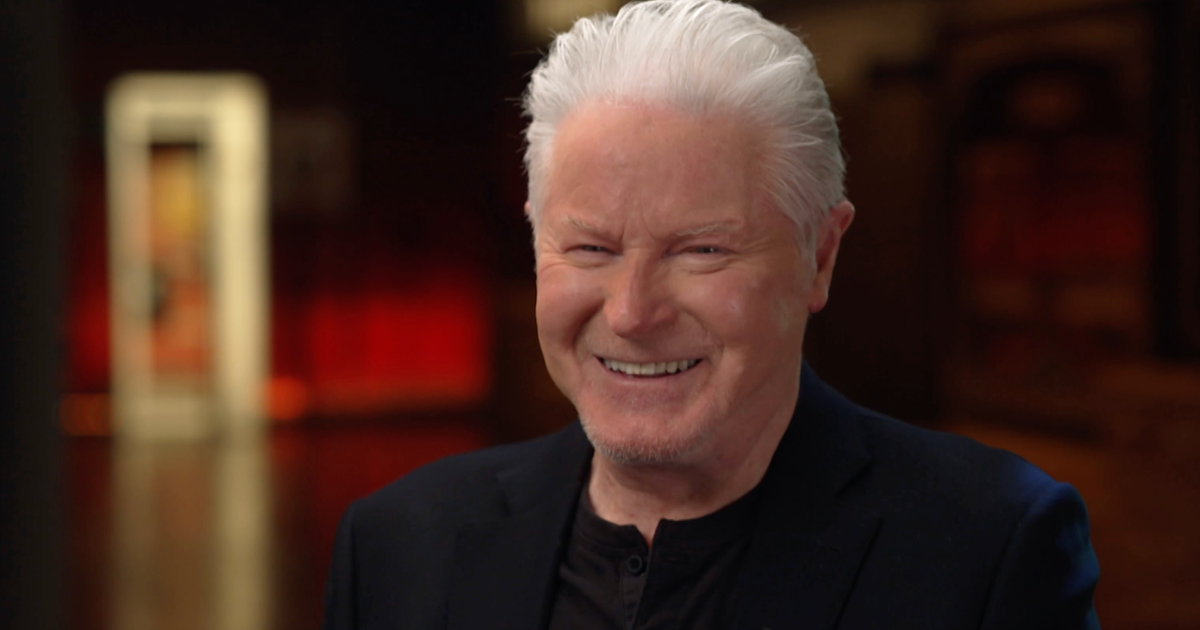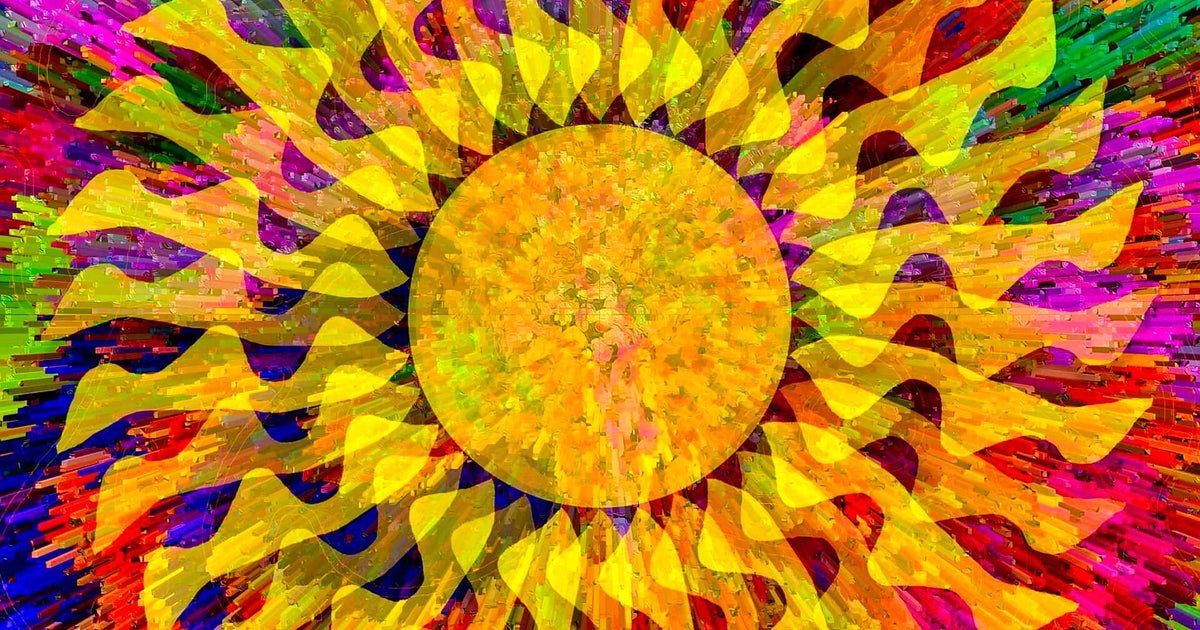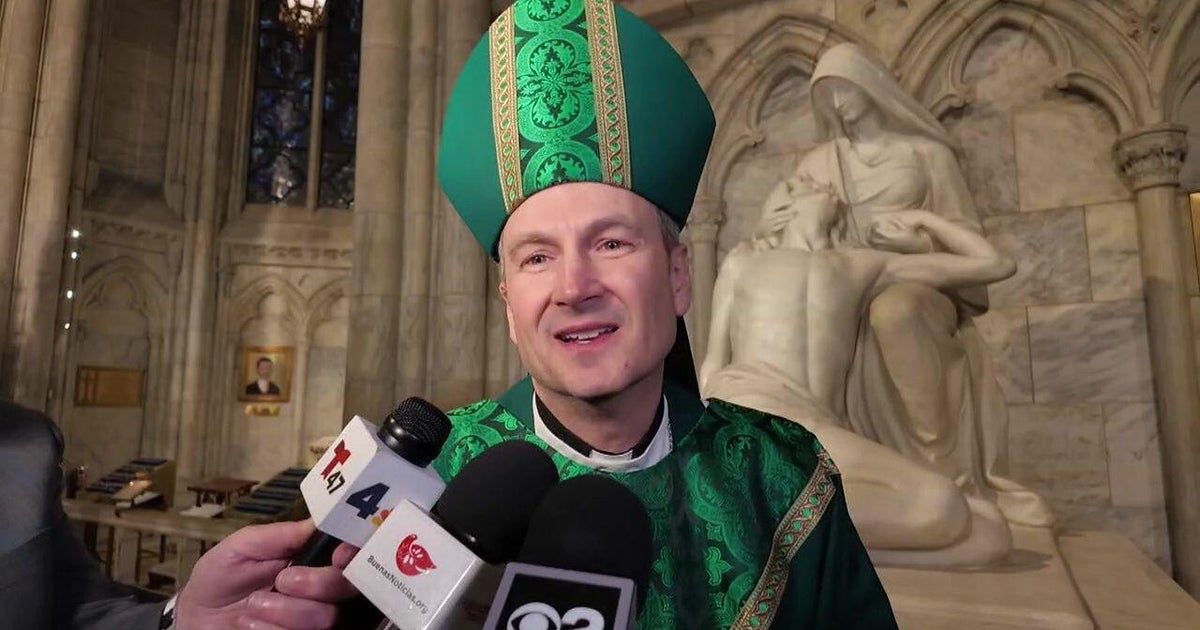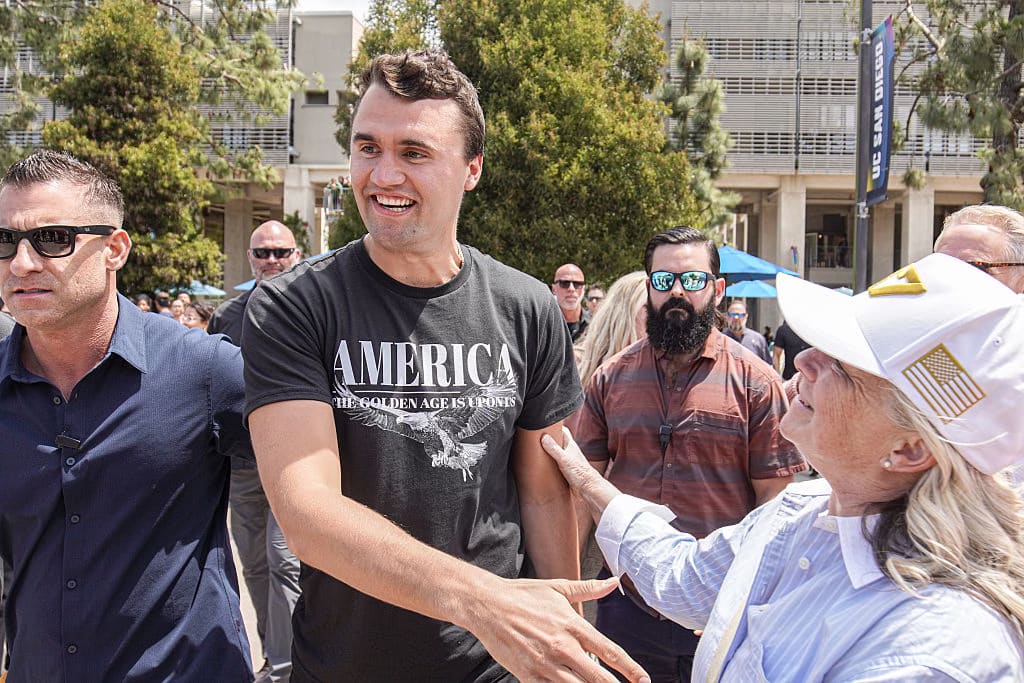Preserving jazz in the Big Easy
There are two words you don't normally associate with the streets of New Orleans: Quiet and empty. It's not that the music ever stopped in the Big Easy, but with the ebb-and-flow of the pandemic, there have been times when the music was hard to share.
As its name suggests, Preservation Hall was established to preserve the music and the traditions of New Orleans jazz, a place of harmony between generations. They've been open and closed during the pandemic. "Sunday Morning" was there in December.
Eighty-nine-year-old Charlie Gabriel is a New Orleans institution, playing here with 33-year-old Branden Lewis, who is no slouch, either. Branden has one Grammy nomination under his belt.
"Sunday Morning" senior contributor Ted Koppel asked Lewis, "Fifty years from now, you think you're still gonna be blowing like this?"
"I would like to imagine so," he replied, "but it might be wishful thinking."
Ben Jaffe, on bass, said, "Playing in front of people and having a communal musical experience is part of New Orleans music."
Sixty years ago, it was Ben's parents, Allan and Sandra Jaffe, who established Preservation Hall. These days, Ben is its creative director, committed to sharing its music. "That's part of New Orleans," he said. "New Orleans music isn't something that exists in a room by yourselves."
"But Ben, that's part of music everywhere, right?" asked Koppel. "I mean, music without an audience …"
"The nuance of New Orleans music is not only what goes on in a theatre, but also what happens out in the street," Jaffe said.
And when the streets are swept empty by COVID-19, as they were at the beginning of the pandemic, you go where the rest of the country's gone – online. Preservation Hall put on a benefit concert, live streamed, with lots of special guests. The half-a-million dollars raised went to support the 60 or so musicians who rotate in and out of the Hall.
Watch this fund-raising video featuring the Preservation Hall Jazz Band, with guest performer Paul McCartney:
Among the musicians hit hardest by the pandemic are the ones who, usually, work on the street.
Like millions of other Americans, Doreen Ketchens (on clarinet), husband Lawrence (on the tuba), and daughter Dorian (on drums) worked from home. As many of us have learned, Zoom is helpful, but it's kind of flat. And when you can't see your audience at all, the chemistry is gone. For Doreen and her family, the spark is on the street.
You would have seen the difference immediately on an unseasonably warm and sunny December morning at the corner of Royal Street and St. Peter. That intersection, as Ben Jaffe told Koppel, is recognized throughout the community as belonging to Doreen: "You don't touch Doreen's corner!" Jaffe said. "That corner is the Times Square of the French Quarter. She is world famous."
She is, after all, a classically-trained musician. Ketchens has played with the Louisiana Philharmonic Orchestra.
She told Koppel, "They'll say, 'Doreen has played for dignitaries and presidents and all over the world, but she'd rather be right here on the street.' I'm like, 'No!'"
On the street or playing with a symphony orchestra, good times, bad times, New Orleans musicians have been schooled and raised in a unique culture:
"My first job as a child," said Charlie Gabriel, "was a funeral."
Gabriel played that first funeral 78 years ago. He was 11 back then and most of the adult musicians were off at war.
Jaffe said, "That is something that's unique to New Orleans – [it's] not just playing for an audience, but music becomes a way to process your sadness."
You go to a funeral in New Orleans, and you end up in a parade. It starts slow and somber…
"Two blocks from the cemetery, then it picks up the tempo of the music," said Gabriel. "The second line is having a ball."
Jaffe said, "There's a joy that lives in this city. There's a resilience here that is oftentimes not really understood, because we don't talk about it. Because it is just something that exists inside the people. And I look to people like Charlie for strength at those moments."
Gabriel and Jaffe have a special relationship.
"My father would have been the same age as Charlie," Jaffe said. "And my father passed away when he was 51 and I was 16."
These past two years, Gabriel and Jaffe have spent almost every day together, practicing and playing, with and without an audience.
"He would come down and he would say, 'OK, we're gonna play this song today,'" Jaffe said. "I learned more songs in the last year-and-a-half. My repertoire grew by, like, a hundred songs."
Like so many of us in lockdown, Doreen Ketchens and her family were feeling the strain: "I was going crazy not being able to play, and I tell people, even if we were out here and nobody was listening, it'd still be a blessing and a wonderful thing to do."
But if you ask Ketchens where she dreams of playing? "Kennedy Center, Carnegie Hall, Albert Hall."
Albert Hall? "Yeah, and then I could wear something shiny!"
"How about Milan? You wanna go to Milan?" asked Koppel.
"Oh, yeah, I've never been to Italy."
Ketchens would knock it out of the park, because she is one of the world's great clarinetists. But what has the tourists gasping, what can get close to a million views when videos are posted online, are her long notes:
Koppel asked, "So, you can just hold your breath or expel for a very long time?"
"Yeah, but I mean, there are tricks, too," she said. "Sometimes if I can hold a note just long enough, they'll be loud enough for me to just take a breath really quickly."
"And keep that note going?"
"That's right."
"We're working our way toward losing one million Americans. That kind of an event has to have an impact. What do you think is going to happen to our music? Will anything memorialize these times, do you think?"
"Well, in New Orleans, it's always a second line," Ketchens replied. "You know, the first line is to honor that person, for the bereaved family to express their grief at the loss of their loved one. And once the last family car passes, the trumpet player, he gives off a call … and then the crowd goes, 'Hey!' And that hey! is supposed to symbolize that the time for bereavement is over. It's time to rejoice, because the person has gone off to a better place. They would release doves, and those doves would symbolize the spirit, the soul of that person rising into the heavens.
"Doves are not easy to come by!' she laughed. "People still had handkerchiefs, and so that's what it is. You know, you wave that handkerchief in the air."
"Time for a lot of handkerchiefs these days," Koppel said.
"Amen," said Ketchens.
Koppel asked Charlie Gabriel, "The country is in a lot of pain …"
"The country is in a lotta pain."
"Are we gonna hear that in your music?"
"Well, you don't want to remind people of so much pain," Gabriel said. "In the music you want it to be joyful. You want to lift them. You want them to feel happy."
And in that spirit, we take note of the passing, at the end of December, of Sandra Jaffe, age 83, co-founder of Preservation Hall, mother of Ben Jaffe. We suspect she would have liked the music to be happy.
For more info:
- Preservation Hall, New Orleans
- Charlie Gabriel
- Branden Lewis
- Doreen's Jazz New Orleans (Doreen Ketchens)
- For photos thanks to Howard Lambert, Chris Granger, Danny Clinch, and New Orleans Musicians' Clinic & Assistance Foundation
- Thank you to Doreens Jazz New Orleans for her concert performance video, and to the Louisiana Philharmonic Orchestra, Solomon Group, and The Historic New Orleans Collection
- New Orleans Jazz Museum
Story produced by Deirdre Cohen. Editor: Ed Givnish.
